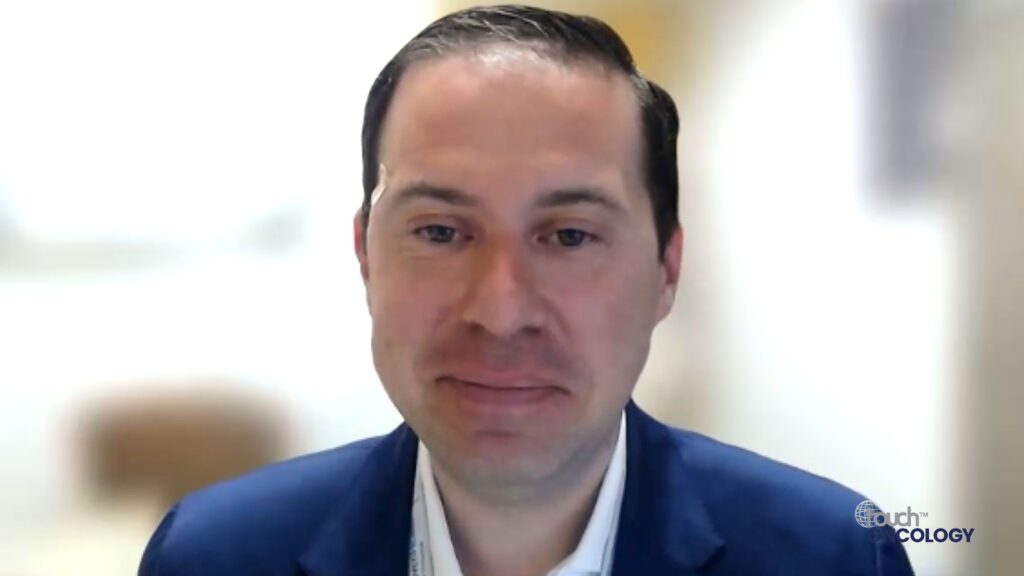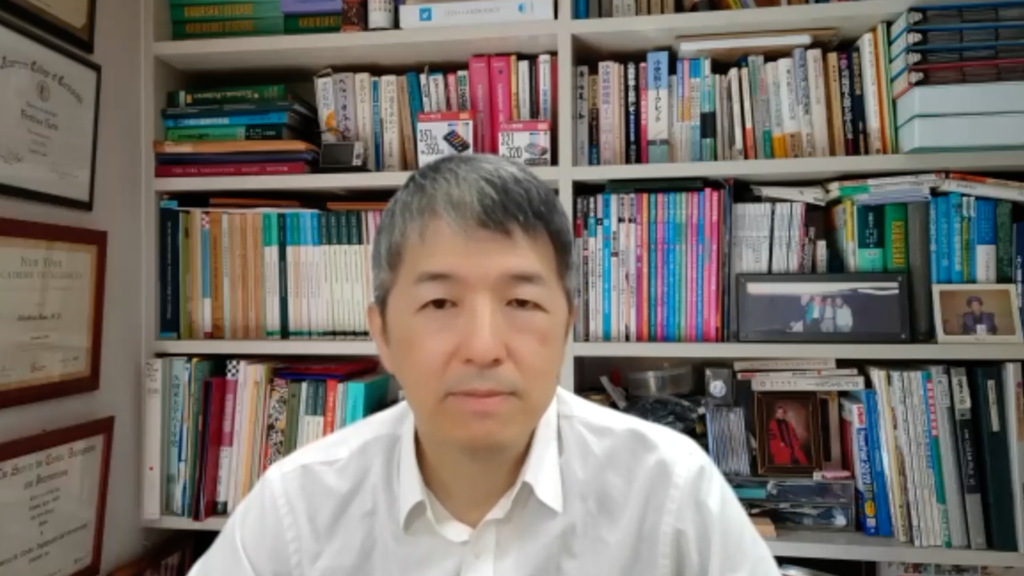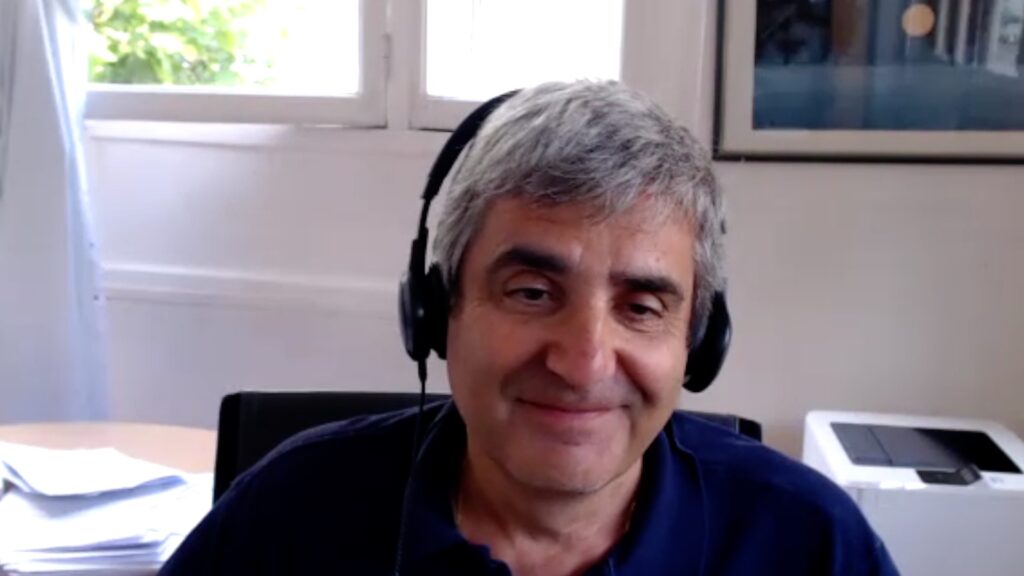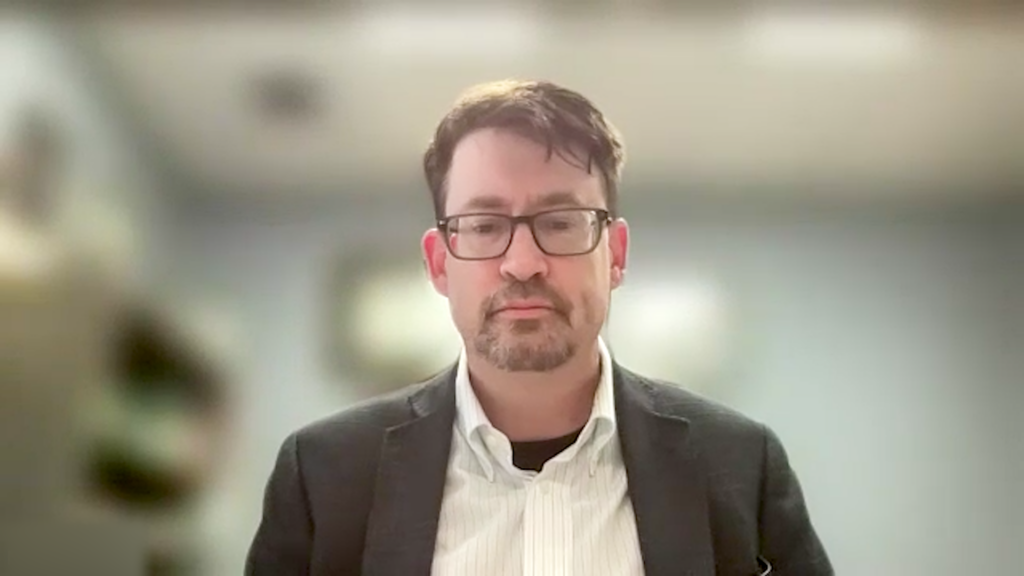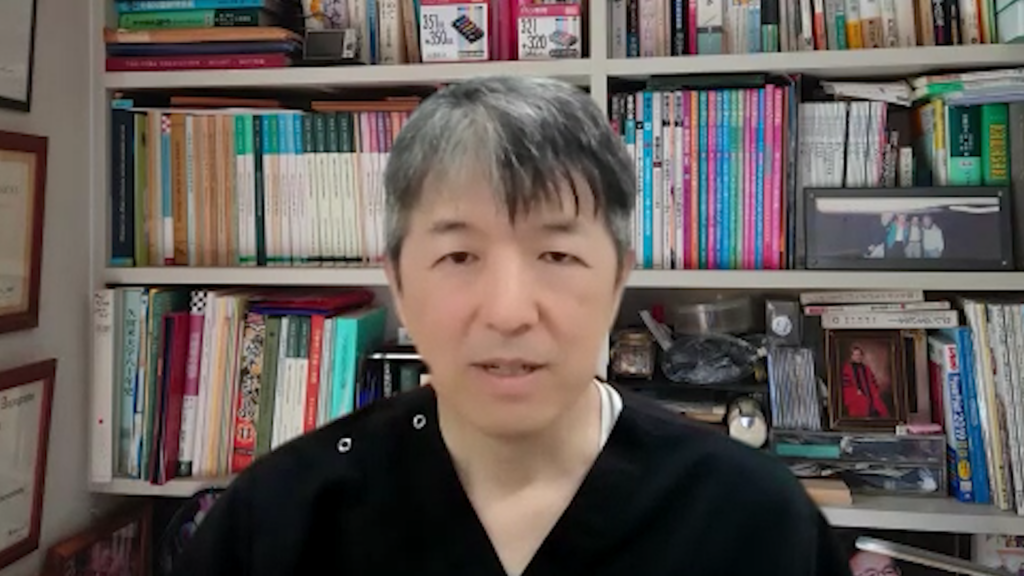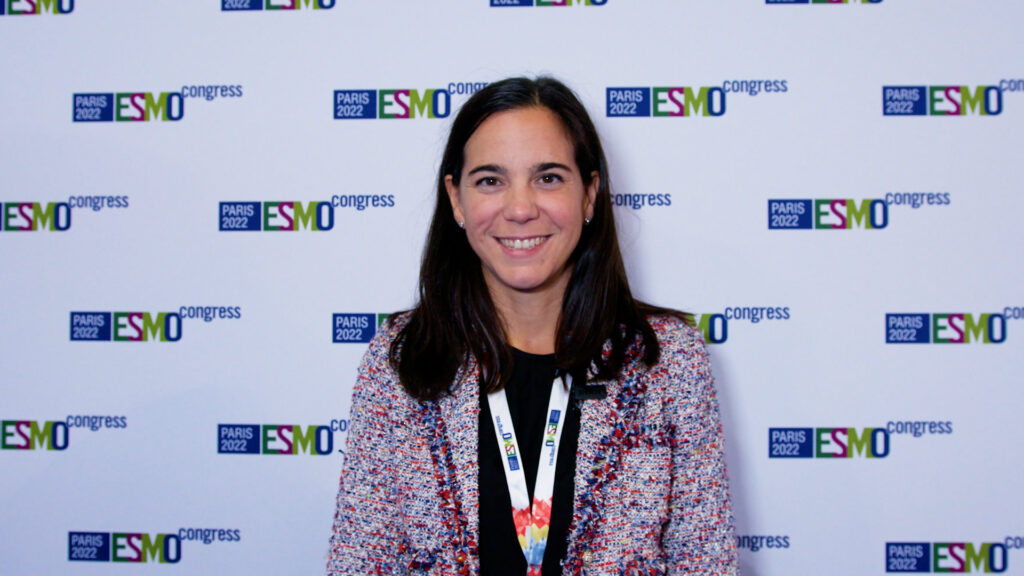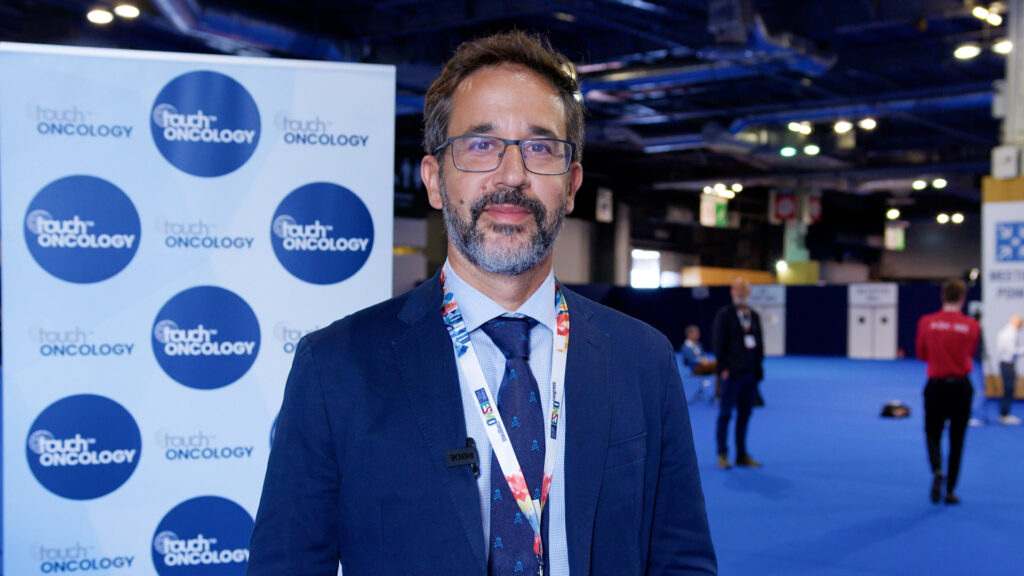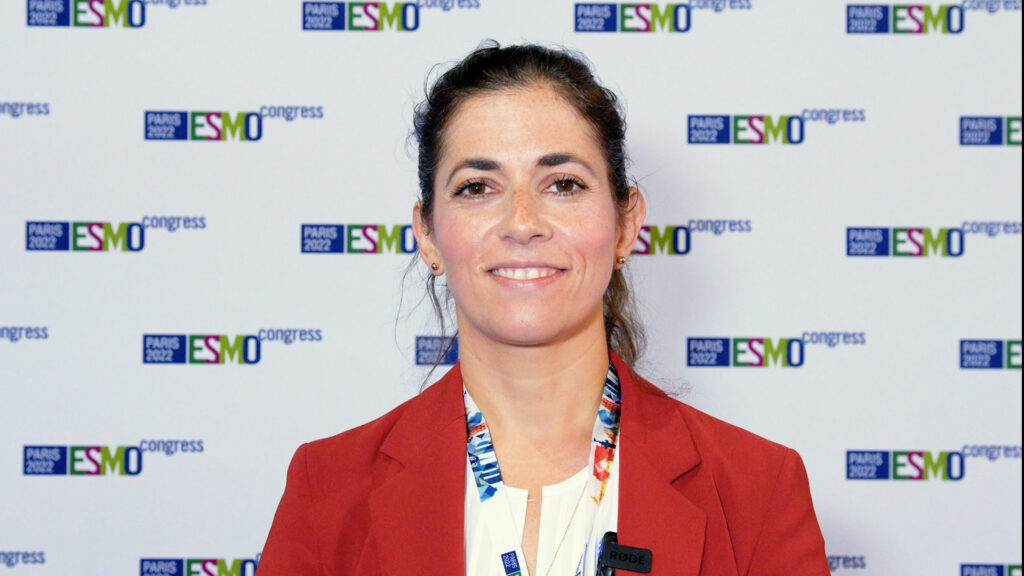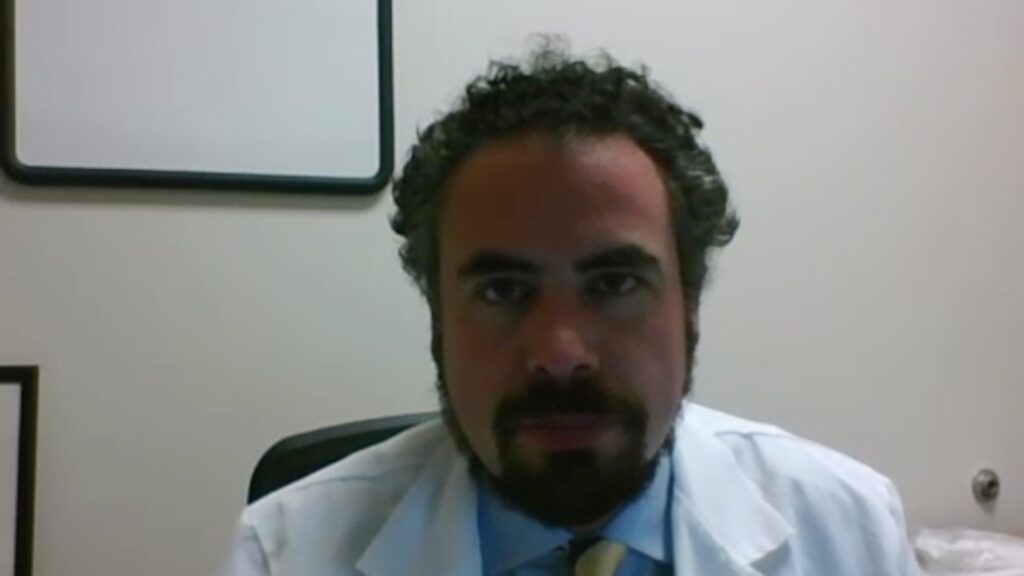touchONCOLOGY spoke with editorial board member Ben Weinberg (Georgetown University, Washington, DC, USA) to discuss his highlights from the American Society of Clinical Oncology (ASCO) Annual Meeting, 2–6, June 2023. This includes data from the Plenary Session randomized phase 3 noninferiority PROSPECT trial, showing that neoadjuvant FOLFOX with selective use of 5-FU chemoradiotherapy (5-FU CRT) was noninferior to 5-FU CRT in participants with locally advanced rectal cancer. He also highlights the translational analysis of the AtezoTRIBE study, the breakthrough D-ToRCH study and the primary results from the multicenter, randomized, phase 2 DESTINY-CRC02 study.
Disclosures: Ben Weinberg has received grant/research support from Ipsen, is on the Advisory Board for Bayer and Taiho, and is a Speaker’s Bureau participant with Bayer, Lilly, Taiho, Sirtex, AstraZeneca and Daiichi Sankyo.
Support: Interview and filming supported by Touch Medical Media. Interview conducted by Sophie Nickelson.
Filmed as a highlight of ASCO 2023
Access more content on colorectal cancer here
Transcript
I’m Ben Weinberg. I’m a gastrointestinal medical oncologist at Georgetown University, part of the Ruesch Center for the Cure of Gastrointestinal Cancers at the Lombardi Comprehensive Cancer Center in Washington, DC.
The first study I’d like to highlight is PROSPECT. This was a study that got a plenary, was in the top four abstracts selected across of all the abstracts, of which I think there were 7,000 plus submitted for the ASCO annual meeting this year in 2023. And it was exciting to see this not only as a gastrointestinal medical oncologist and as one who specializes in colorectal cancer, but also we participate in this trial and I believe put forward patients on the study. PROSPECT was a large international trial in the US and Canada, I believe also Switzerland, looking at over 1,100 patients to try to answer the question “Can we get away with not giving radiation for folks for certain types of rectal cancer?”
So, patients were included if they had clinical stage T2 or T3, node-positive or negative, had to be candidates for low anterior resection surgery, so these were mostly mid and upper rectal cancers, and patients were randomized due to the standard of care at that time and that era, which was chemoradiation followed by surgery. And then adjuvant chemotherapy was left at the discretion of the treating medical oncologist, versus the experimental arm, which was chemotherapy first with FOLFOX and then a repeat MRI, and if there was some degree of tumour shrinkage by 20% or more, patients went straight to surgery, and if there wasn’t, then they got the traditional chemoradiation and surgery followed by adjuvant chemotherapy.
And after, you know, many years of analysis, it ended up to be what we would call a positive trial, using non-inferiority design to show that one arm was not better than the other, quote-unquote, and there were some trade-offs in toxicity, but in terms of disease-free survival, overall survival, everything was pretty much almost exactly the same. And there were definitely some issues with patients who got radiation in terms of long-term local side effects, bowel dysfunction, sexual dysfunction, etc., which were obviated by omitting radiation. So, this has actually quite changed our practice, I think, to some extent, with the caveats that not everybody was eligible for this study, patients could not have a threatened radial margin for their surgery and they had to be low anterior resection candidates. They weren’t really candidates for what we would call “watch and wait”, which is trying to skip surgery, which is a whole different question and really a different patient population.
And you know, putting it all together, I think for lower rectal cancers, we’re still going to be doing what’s kind of in the current era, a total neoadjuvant of doing chemotherapy and chemoradiation, and then surgery last. Again, this trial was done in sort of an earlier era when total neoadjuvant therapy was not adopted. So, it is going to probably decrease the amount of radiation we do for the higher up rectal cancer, which we already knew kind of benefited less from radiation, the higher you go up in the rectum. We don’t do radiation for colon cancers, it’s sort of the same idea. So this is really a big sea change in kind of how we approach localized rectal cancer and I think it will alter practice management for our patients.
The second abstract I’d like to discuss is the AtezoTRIBE study, this is out of Italy. This is a randomized study looking at the Italian preferred spicy chemotherapy regimen of FOLFOXIRI ,with or without, with bevacizumab, with or without atezolizumab, an anti-PD-L1 monoclonal antibody immunotherapy drug. And the Italians have been very prominent and well-known for using this aggressive chemotherapy regimen. They’re the ones who really showed a survival benefit versus a chemotherapy doublet with bevacizumab. And here they did see some increase in progression-free survival in the group that got upfront atezolizumab with chemotherapy and bevacizumab but there didn’t seem to be a whole lot of an overall survival benefit and was relatively small population to try to figure out overall survival. However, the group that did seem to benefit quite substantially was the group that had a high immunoscore and it’s a new immunoscore which looks at tumour infiltrating lymphocytes, so basically CD4, CD8+ T cells in the tumour and tumour immune microenvironment, plus localized PD-L1 staining. And when they looked at that group, which is about a third of patients, that group did significantly better with the addition of atezolizumab versus those who did not.
And we’ve known I think for some time that outside of the microsatellite instability high group, which is only about 4% of metastatic colorectal cancer, those patients really benefit even from single-agent immune therapy. We know that there’s part of, the 96%, that are microsatellite stable. There are some patients that clearly do benefit from immunotherapy and we see this in patients enrolled on trials in different settings. So we think maybe we have finally found a better biomarker to try to predict who these patients are.
And again, it’s probably a combination of T cell infiltrate within the tumour immune microenvironment and local PD-L1 staining. So this is a big interest to me and those of us who design clinical trials in this space. What’s interesting though is that we think you know folks who benefit from immunotherapy maybe don’t need as much chemotherapy. So they’re planning to launch a Phase 3 study using the same chemotherapy backbone just for this population with the high immunoscore, high localized PD-L1 staining, but I’d be interested in trying to do it actually with less chemotherapy because maybe for this subpopulation, you don’t need as much chemotherapy because there’s more benefit from immune therapy and they’re giving basically as much chemotherapy as one can give.
So, it’s an interesting finding that I think needs to be borne out in larger prospective clinical trials, but is definitely hypothesis generating for future clinical trial design and definitely piqued my interest.
I want to say that kind of flew a little bit under the radar that honestly I was completely missed because it wasn’t in the colorectal session, was the study out of India, the TORCH-D study where they looked at patients who were getting capecitabine either alone or in combination for breast cancer or gastrointestinal cancers, randomizing them one to one to placebo or diclofenac topically for the prevention of hand-foot syndrome and they showed that, with the addition of diclofenac topically ,they actually reduced the incidence of severe and all grade hand-foot syndrome, which is very debilitating for patients and often limits how much capecitabine we can administer to these patients.
It’s not a perfect study. The placebo control arm is a little lacklustre. We would typically use urea-based creams, like Udderly cream, for these patients. So it’d be interesting to do a Phase 3 study where you randomize diclofenac topically versus topical urea-based cream.
And it was also kind of a heterogeneous patient population, as mentioned, it included both breast cancer patients, GI cancer patients, single-agent, multi-agent, different lines of therapy, unclear, you know, exactly what other lines of therapy they got before this. So, those would all factor into the incidence of, you know, severe hand-foot syndrome. But I’ve already actually started trying it out in my own practice because, especially for patients who had some hand-foot syndrome despite dose reductions with urea-based cream, you know, I don’t think there’s a whole lot to lose in trying diclofenac topically.
So we’ll see what happens, but I think it definitely interested me in sort of my clinical management, but also trying to design the studies with a better placebo, a better arm than a placebo.
The last thing that we wanted to highlight was updates from the DESTINY colorectal cancer study. This is in a relatively rare population of patients with metastatic colorectal cancer that are HER2 positive. It’s only probably about 5%, it’s a little bit more heavily enriched in rectal and near rectal cancers, but we think these patients can actually benefit from HER2 targeted therapy. Recently, the FDA approved the first, a HER2 targeted combination with trastuzumab and tucatinib in the United States.
This study featured trastuzumab deruxtecan, which is a little different, it’s an antibody drug conjugate targeting HER2 with a topoisomerase payload. This drug has already been used quite extensively in breast cancer, in upper GI cancers, that are HER2 positive and here we see updated data that show that this is really effective with a high response rate in the 40% plus range and also with fortunately a relatively low incidence of its dreaded toxicity which is interstitial lung disease or pneumonitis.
And it also sort of supported what I’ve been doing in practice, which is really never giving the higher dose of this drug. 6.4 milligrams per kilogram. I typically only give 5.4 milligrams per kilogram as is used in other disease types, which also seems to be associated with less toxicity but similar, if not superior, efficacy than the 6.4 milligram per kilogram group. So it’s exciting that we may have yet another option for this relatively rare subset of patients but with very effective treatment options, in this case targeted chemotherapy as opposed to doublet HER2 targeted therapy.


